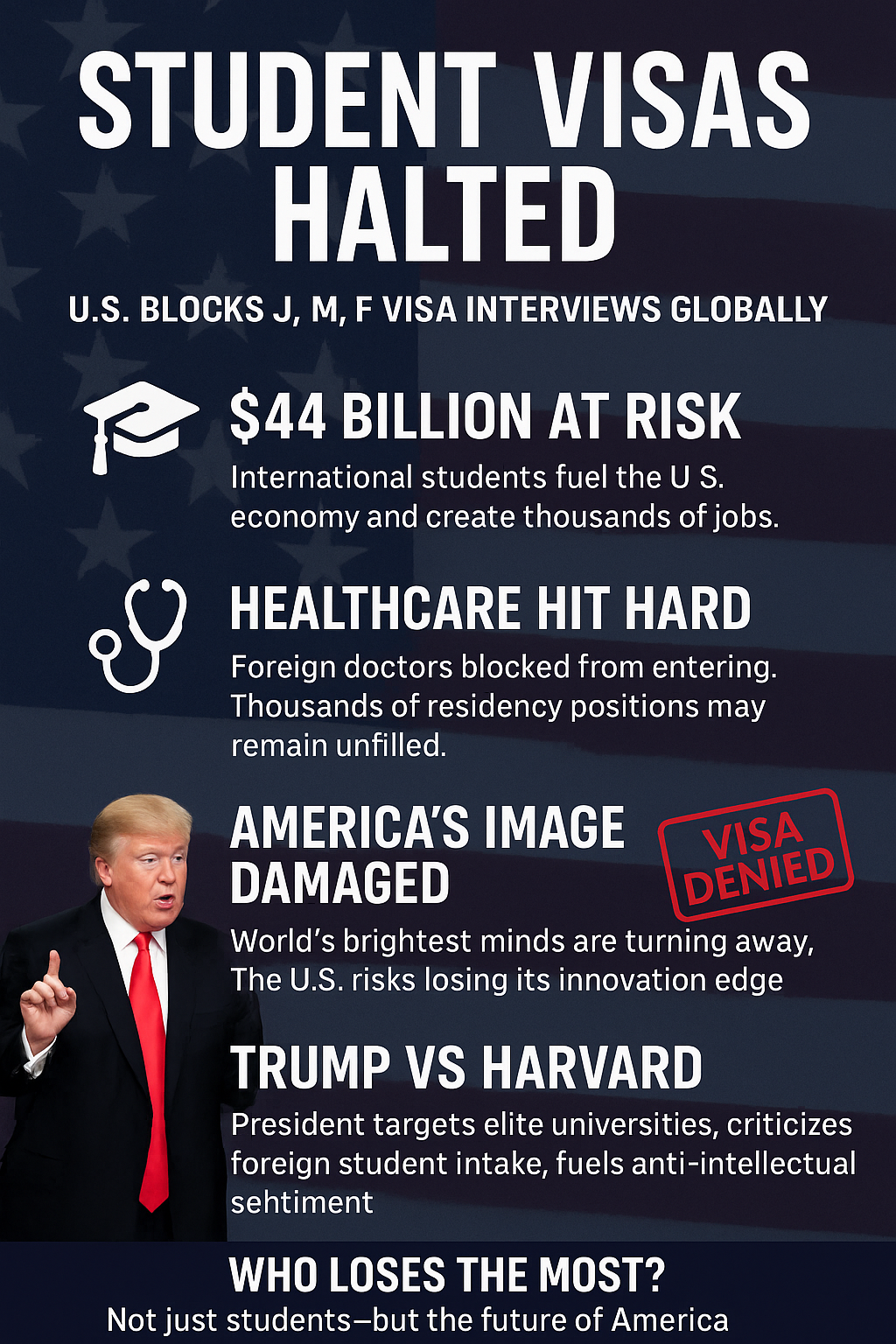How U.S. Student Visa Ban Is Hurting the American Economy, Healthcare & Global Reputation
U.S. halts J, M, F visas under Trump—impacting international students, healthcare, and $44B in economic contributions. What does this mean for America?
Introduction: A Silent But Destructive Policy Shift
In a sweeping policy change, U.S. consulates worldwide have been instructed to pause all visa interviews for international students, including J, M, and F visa applicants. This move, made under the Trump administration, is already triggering economic disruption, threatening healthcare staffing, and damaging America’s global reputation as a hub for education and innovation.
📉 The Economic Fallout: $44 Billion at Risk
In the 2023–2024 academic year, international students in the U.S. contributed over $44 billion to the national economy. This includes spending on tuition, housing, travel, and living expenses. International student enrollment supports over 400,000 jobs across various sectors—from education and housing to food and retail.
With the student visa freeze, universities are bracing for a significant drop in enrollment. Many institutions, especially public universities, rely on foreign tuition to fund research, faculty salaries, and student resources. A decline in these numbers could lead to layoffs, program cuts, and diminished academic output.
🎓 Trump vs. Harvard: A Political Power Play
President Donald Trump’s growing hostility toward elite institutions like Harvard University has added fuel to the fire. His administration has criticized Harvard’s large foreign student population—more than 25% of the total student body—and attempted to investigate the school’s admissions policies.
Although a federal judge blocked the administration’s attempt to bar foreign students from attending Harvard, the message is clear: foreigners are being sidelined in favor of domestic political narratives.
This strategy may appease Trump’s voter base, which views Ivy League schools as elitist and exclusionary, but it risks pushing away global talent that helps these institutions thrive.
🏥 A Looming Healthcare Crisis
Foreign Medical Graduates (FMGs) play a vital role in the U.S. healthcare system, particularly in residency programs across underserved areas. Each year, thousands of FMGs are placed in U.S. hospitals, filling crucial gaps in staffing, especially in primary care and rural medicine.
With visa issuance paused, many of these doctors will not be able to start their training, leaving thousands of medical residency slots unfilled. This could cripple healthcare systems already strained from pandemic aftershocks.
It’s a healthcare time bomb—experienced physicians ready to serve, but stuck due to politics.
🌍 A Blow to America’s Global Academic Standing
For decades, the United States has been the global leader in higher education and scientific research. Top students, scientists, and innovators from around the world came to the U.S. not just for degrees but to contribute to groundbreaking research and innovation.
The new visa restrictions now send the opposite message: “You’re not welcome.”
As a result, countries like Canada, the UK, Germany, and Australia are stepping in. They’re offering friendlier immigration policies, scholarships, and research opportunities—poaching the very talent the U.S. used to attract.
This policy risks a brain drain that weakens America’s position in global technology, medicine, and innovation.
🧠 Meritocracy Undermined: The Bigger Picture
Beyond economics and healthcare, the visa freeze threatens America’s core identity as a meritocratic society. When immigration becomes politicized, and visa access depends more on ideology than achievement, the U.S. loses its competitive edge.
Research institutions rely on collaboration, diversity, and international input. Cutting off access to global talent is not just unfair to aspiring students—it’s self-sabotage.
🇺🇸 From Global Leader to Fortress America
What’s especially concerning is the ideological shift. Under Trump’s policies, America is moving from a beacon of intellectual freedom to an isolationist fortress. These decisions aren’t driven by security concerns, but by political ideology aimed at pleasing a narrow domestic base.
This transformation is happening fast—and its consequences may be irreversible if action isn’t taken.
🔚 Conclusion: Who Loses the Most?
In the short term, it’s the international students and medical graduates whose futures are on hold.
In the long term, it’s America that stands to lose the most—economically, culturally, and scientifically.
If the U.S. wants to remain a global leader in innovation, education, and healthcare, it must reverse these restrictive visa policies and return to a path of inclusion and opportunity.
📎 Suggested External References:
- Institute of International Education (IIE)
- Education Data Initiative – International Student Stats
- U.S. News – Visa Policy News
